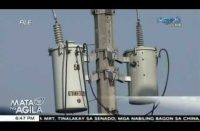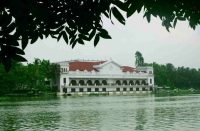
Ukrainian servicemen ride on an armored vehicle near Kramatorsk September 15, 2014.
Credit: Reuters/Gleb Garanich
KIEV
(Reuters) – Fighting broke out again in Ukraine’s rebel-held city of Donetsk on Monday as President Petro Poroshenko prepared to unveil a risky plan to give the separatist-minded east “special status” in a bid to end a conflict that has killed over 3,000 people.
The renewed fighting in the east’s main industrial hub, following a weekend in which at least six people were killed and a team of international monitors was shelled, put fresh strain on a 10-day-old ceasefire between government forces and Russian-backed separatists.
The truce started on Sept. 5 and had been broadly holding up before this weekend, despite sporadic violations.
But on Saturday there was particularly heavy fighting around Donetsk airport, which remains under government control, and shells hit a marketplace in the city, killing at least one woman, according to the OSCE.
By Monday evening, shelling and missile fire could be heard from the airport area, the railway station and Leninsky district near the center, a Reuters correspondent in Donetsk reported.
The rebels’ main leader in Donetsk, which had a pre-war population of about one million, accused Ukrainian forces on Monday of violating the truce repeatedly and suggested it could not hold much longer.
“I do not see the sense in (further) consultations. There have to be measures which must first be undertaken and then consultations can take place,” Alexander Zakharchenko told reporters in Donetsk.
TEMPORARY SELF-RULE
The fresh fighting flared as Poroshenko prepared to submit to parliament a draft law that local media said would grant temporary self-rule status to the “people’s republics” proclaimed by the separatists.
Poroshenko reluctantly agreed to the ceasefire after battlefield losses and heavy Ukrainian casualties which Kiev said were caused by Russian troops entering the fray on behalf of the rebels.
He hopes the law will counter criticism from Russian President Vladimir Putin that he is failing to address the grievances of the pro-Russian east – something which the Kremlin uses to justify its support for the rebels.
But Poroshenko risks falling foul of Kiev’s pro-Western establishment if he is perceived as laying the ground for a new “frozen conflict” on Ukrainian territory, governed by a separatist leadership under Russian protection, similar to those in other ex-Soviet states such as Moldova and Georgia.
The draft, whose contents were leaked on Monday to local media, would grant self-rule to separatist-minded regions for a three-year period and allow them to “strengthen and deepen” relations with neighboring Russian regions.
Commentators say this last point risks impinging on Kiev’s declared policy of European integration and may stir opposition within Kiev’s political establishment.
The draft would allow the heavily-armed rebels to set up their own police forces and hold their own local elections in November.
It would also offer freedom from prosecution to “participants in the events” in the east — an apparent offer of an amnesty to separatist fighters, until now demonized in Kiev. But Poroshenko on Monday denied this would be an amnesty for those guilty of serious crimes.
Poroshenko, in comments on his website, referred to what he described as a “program for giving roots to peace”, adding: “Over this period (three years) we will be able to implement deep decentralizations which should require amendments to the constitution.”
There was no formal reaction from separatist leaders, who have attended peace talks with Ukrainian, Russian and OSCE officials who also negotiated the ceasefire deal.
But the Russian news agency RIA quoted one leader, Andrei Purgin, as saying: “This is a draft law for Ukraine. Perhaps this will be a point of discussion at future negotiations but no more than that.”
OSCE TEAM UNDER FIRE
Ukrainian government forces last month had been tightening their grip on Donetsk. But they then suffered serious losses east of the city and in the southeast, with Kiev accusing Russia of directly intervening to support the rebels.
Russia denies charges it has sent troops into Ukraine and has been arming the rebels.
Donetsk city council said two northern districts of the city were shelled on Sunday, damaging homes and public buildings. “As a result of the shelling, six civilians were killed and 15 people were wounded by shrapnel to varying degrees,” it said.
Separately, military spokesman Andriy Lysenko said in Kiev there had been some deaths among Ukrainian troops over the weekend, although he did not provide details, and said 73 soldiers had been freed in an exchange with the rebels.
A statement by the Organization for Security and Cooperation in Europe (OSCE) said meanwhile that vehicles carrying a six-person monitoring team had been hit by artillery fragments on the outskirts of Kirovske, to the east of Donetsk, and then shelled again later.
None of the OSCE team was injured, though a statement said other monitors in Donetsk had seen the body of a woman lying in the street.
“All six colleagues were able to get back to base, but both vehicles were badly damaged,” spokesman Michael Bociurkiw said. “We regard this as a very serious incident. It’s the first time our vehicles have taken fire,” he told Reuters.
Bociurkiw could not say who was responsible and there was nothing to suggest the monitors had been deliberately targeted. “It all points to the fragility of the ceasefire,” he said.
The rebel leader, Zakharchenko, said the OSCE team had been caught in crossfire between separatists and government forces.
“We didn’t even know they were there. The OSCE mission decided to go there on its own. I have explained that this is not Europe in which war can run according to a timetable … It is a real civil war in which there are no rules, no timeframe,” he told journalists in Donetsk.
(Additional reporting by Anton Zverev in Donetsk and Pavel Polityuk in Kiev; editing by Andrew Roche)







